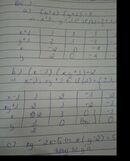Bài 1: Tìm các số nguyen x,y:a ) xy - 2x - y= -6
Hãy nhập câu hỏi của bạn vào đây, nếu là tài khoản VIP, bạn sẽ được ưu tiên trả lời.


Bài 1:
b) \(2x+6⋮x-3\)
\(\Leftrightarrow2\left(x-3\right)+12⋮x-3\)
Mà \(2\left(x-3\right)⋮x-3\)
\(\Rightarrow12⋮x-3\)
làm nốt
d) \(x-1⋮2x+1\)
\(\Leftrightarrow2x-2⋮2x+1\)
\(\Leftrightarrow2x+1-3⋮2x+1\)
Mà \(2x+1⋮2x+1\)
\(\Rightarrow3⋮2x+1\)
Làm nốt

Bài 1:a) Ta có: \(1-3x⋮x-2\)
\(\Leftrightarrow-3x+1⋮x-2\)
\(\Leftrightarrow-3x+6-5⋮x-2\)
mà \(-3x+6⋮x-2\)
nên \(-5⋮x-2\)
\(\Leftrightarrow x-2\inƯ\left(-5\right)\)
\(\Leftrightarrow x-2\in\left\{1;-1;5;-5\right\}\)
hay \(x\in\left\{3;1;7;-3\right\}\)
Vậy: \(x\in\left\{3;1;7;-3\right\}\)
b) Ta có: \(3x+2⋮2x+1\)
\(\Leftrightarrow2\left(3x+2\right)⋮2x+1\)
\(\Leftrightarrow6x+4⋮2x+1\)
\(\Leftrightarrow6x+3+1⋮2x+1\)
mà \(6x+3⋮2x+1\)
nên \(1⋮2x+1\)
\(\Leftrightarrow2x+1\inƯ\left(1\right)\)
\(\Leftrightarrow2x+1\in\left\{1;-1\right\}\)
\(\Leftrightarrow2x\in\left\{0;-2\right\}\)
hay \(x\in\left\{0;-1\right\}\)
Vậy: \(x\in\left\{0;-1\right\}\)
Bài 1 :
a, Có : \(1-3x⋮x-2\)
\(\Rightarrow-3x+6-5⋮x-2\)
\(\Rightarrow-3\left(x-2\right)-5⋮x-2\)
- Thấy -3 ( x - 2 ) chia hết cho x - 2
\(\Rightarrow-5⋮x-2\)
- Để thỏa mãn yc đề bài thì : \(x-2\inƯ_{\left(-5\right)}\)
\(\Leftrightarrow x-2\in\left\{1;-1;5;-5\right\}\)
\(\Leftrightarrow x\in\left\{3;1;7;-3\right\}\)
Vậy ...
b, Có : \(3x+2⋮2x+1\)
\(\Leftrightarrow3x+1,5+0,5⋮2x+1\)
\(\Leftrightarrow1,5\left(2x+1\right)+0,5⋮2x+1\)
- Thấy 1,5 ( 2x +1 ) chia hết cho 2x+1
\(\Rightarrow1⋮2x+1\)
- Để thỏa mãn yc đề bài thì : \(2x+1\inƯ_{\left(1\right)}\)
\(\Leftrightarrow2x+1\in\left\{1;-1\right\}\)
\(\Leftrightarrow x\in\left\{0;-1\right\}\)
Vậy ...

a)xy+3x=-2y-6
xy+3x-2y-6=0
x(y+3)-2(y+3)=0
(y+3)(x-2)=0
=>y+3=0 và x-2=0
y=-3 và x=2

cũng cuồng song joong ki của hậu duệ mặt trời à . chăm chỉ đọc ngôn tình nha bạn

\(a)\)
\(\left(x+3\right)\left(y+1\right)=3=1.3=\left(-1\right).\left(-3\right)\)
Ta có bảng sau:
| \(x+3\) | \(1\) | \(-1\) | \(3\) | \(-3\) |
| \(y+1\) | \(3\) | \(-3\) | \(1\) | \(-1\) |
| \(x\) | \(-2\) | \(-4\) | \(0\) | \(-6\) |
| \(y\) | \(2\) | \(-4\) | \(0\) | \(-2\) |
Vậy ...
\(b)\)
\(\left(x-1\right)\left(xy+1\right)=2=1.2=\left(-1\right).\left(-2\right)\)
Ta có bảng sau:
| \(x-1\) | \(1\) | \(-1\) | \(2\) | \(-2\) |
| \(xy+1\) | \(2\) | \(-1\) | \(1\) | \(-1\) |
| \(x\) | \(2\) | \(0\) | \(3\) | \(-1\) |
| \(y\) | \(\frac{1}{2}\) | Loại | \(0\) | \(2\) |
Vậy ...
\(c)\)
\(xy-2=5\)
\(\Leftrightarrow x\left(y-2\right)=5=1.5=\left(-1\right).\left(-5\right)\)
Ta có bảng sau:
| \(x\) | \(1\) | \(-1\) | \(5\) | \(-5\) |
| \(y-2\) | \(5\) | \(-5\) | \(1\) | \(-1\) |
| \(y\) | \(7\) | \(-3\) | \(3\) | \(1\) |
Vậy ...
